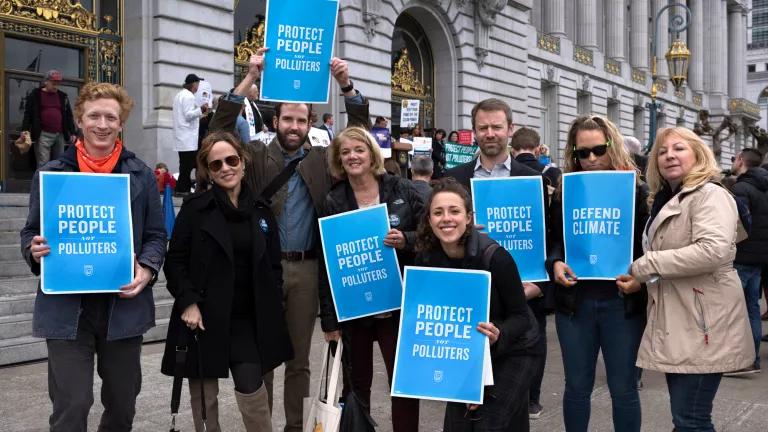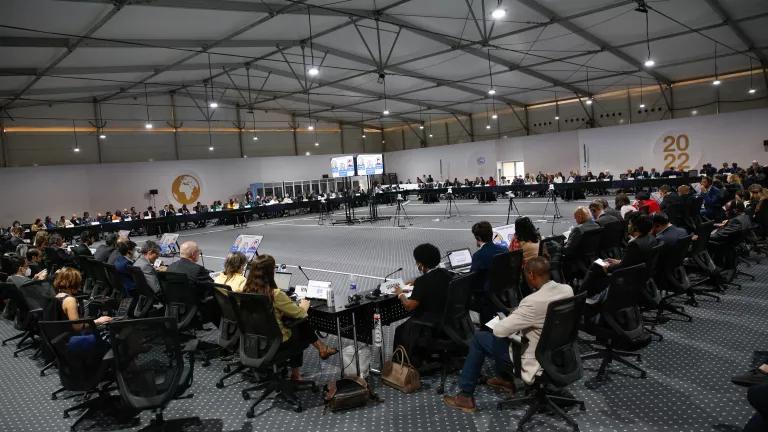Deal of the Century: Tie the USMCA to Paris
Shortly after taking office in 2017, President Trump announced his intention to pull the United States out of the Paris Climate Agreement. The earliest he can technically do that is November 2019.
House Democrats have made a bill to stay in the Paris Agreement (H.R.9) one of their top-ten priorities for this Congress. On May 2, H.R.9 passed the House by a vote of 231 to 190, with all Democrats voting for it, plus three Republicans.
We applaud this demonstrated congressional support for staying in Paris and making climate a top priority. It was the first pro-climate vote in Congress in a decade. But the Senate likely won’t take it up, so the President can still withdraw from Paris later this year. So, what’s the next play?
The answer lies in President Trump’s top legislative priority this year: seeking congressional approval of an updated North American Free Trade Agreement (NAFTA), called the United States-Mexico-Canada Agreement, or USMCA.
Withholding a USMCA vote until Trump promises to stay in Paris and fix the deal’s other fundamental flaws is the only remaining leverage Democrats have left to stop him from initiating the withdrawal process later this year.
The USMCA marks a unique point in U.S. trade history—being the first time the United States has renegotiated a major trade agreement and coming at a dire time when urgent, bold and ambitious climate action is desperately needed. Thus, it represents a chance for both President Trump and Democrats in Congress to get major victories: Trump on a key campaign pledge, and Democrats on climate and environment, labor, and consumer protection.
Unfortunately, the USMCA does not address climate and falls short on other environmental topics, so NRDC cannot support it as it is currently written (see our corresponding blog for more details). But its fate is currently in Congress’s hands and Congress has power to say the deal will not get a vote unless and until fundamental changes are made.
Although the Trump administration is pushing for a quick ratification of the USMCA by this summer, Congress should take its time and withdraw from the fast-track process to ensure the USMCA addresses climate change and meets baseline environmental criteria. In addition, Congress should withhold a vote on the trade pact until President Donald Trump promises to remain in the Paris Agreement.
There’s much Congress can do to make that happen.
Next Steps for Congress
Modern trade agreements increasingly resemble comprehensive international treaties. Though tariffs are still at their core, trade agreements now go way beyond simply tariffs to address a wide range of issues. Trade agreements also incorporate other international agreements, including environmental ones like the Montreal Protocol. Given the desperate need for global climate action, it’s not a reach to believe Paris should be included in trade agreements going forward.
The Constitution gives the President power to sign trade agreements but gives Congress power to approve them. Though the President can lead on trade negotiations, ultimately, Congress has the final say.
President Trump signed the USMCA late in 2018. Congress now has four options:
- It could approve the USMCA as currently written through the fast-track process.
- It could withdraw from the fast-track process and withhold a vote until the Trump Administration has fixed fundamental shortcomings on several fronts, including environmental, labor and other issues. House Democrats have already done this once before—when President George W. Bush sent the U.S.-Colombia FTA to Congress for approval in 2007, Congress withdrew from the fast-track process and didn’t approve it until 2011 after changes were made to the agreement.
- It could ask for deeper changes to the core text without removing fast-track, in hopes that the Trump administration would send the text back to the trilateral negotiating table. We should note that the Mexican president is against reopening negotiations.
- It could reject the USMCA outright.
We see #2 as the most realistic path forward. We expect the Republican-led Senate to fast-track the USMCA. But Democrats in the House of Representatives have the power to withdraw their chamber from the fast-track process to spend more time reviewing the deal and leverage critical concessions from the Trump administration.
Withdrawing from the fast-track approval process will allow House Democrats to hold hearings on the USMCA, something they and the environmental and labor community demanded but was never granted by Republicans who controlled both the House and Senate during the renegotiation process.
Congressional hearings on the USMCA will help educate members of Congress and the public more about the deal. They will certainly reveal that the USMCA is far from complete, not just on environment and climate, but on other fronts as well.
Addressing Climate through Trade
At this point, a new NAFTA that addresses climate and meets our baseline environmental criteria is still technically achievable.
Republican presidents and Democratic lawmakers have compromised to strengthen environmental trade provisions before. On May 10, 2007, President Bush and Democratic members of Congress signed an agreement to strengthen environmental and labor provisions in pending free-trade deals with Peru and Panama, including requirements to “adopt, maintain, and implement” domestic policies to enforce seven Multilateral Environmental Agreements (MEAs). The USMCA should treat the Paris Agreement in the same way, requiring each country to “adopt, maintain, and implement” domestic policies to uphold their nationally determined contributions to the Paris Agreement.
Democrats have already begun to indicate their dissatisfaction with the USMCA as it currently is written. On April 9, House Ways and Means Committee Chairman Richard Neal sent a letter to the U.S. Trade Representative (USTR), Robert Lighthizer, outlining his concerns about how much is missing from the USMCA. Shortly after, on April 17, all the Democrats on the House Ways and Means Committee joined a letter to the USTR outlining their concerns with environmental provisions in the USMCA. Both letters mention the May 10 Agreement but fail to make the connection that the Paris Agreement is a major multilateral environmental agreement that didn’t exist in 2007.
The May 10 Agreement should serve as a basis for a new compromise between the president and Congress. But 12 years have passed since it was created. The Paris Agreement must be included in any new compromise.
Other Ways the USMCA could Help Fight Climate Change
Given the urgency and scale of action required to mitigate global warming in the next 20 years, Congress should also consider other ways to reduce climate-warming emissions through trade. As a backstop to some sort of new “May-10-plus-Paris” compromise for USMCA, Congress could create automatic enforcement mechanisms that would apply to any trading partner failing to meet its commitments to the Paris Agreement.
One example that has bipartisan appeal and support from labor is implementing border carbon adjustments to impose tariffs on imports with high carbon footprints. Border carbon adjustments, or carbon tariffs, would achieve the domestic manufacturing protections this administration is already pursuing and address climate in a meaningful way. To avoid administrative burden, they could just target the most polluting sectors, or most carbon-intensive goods.
Recently, some House Democrats asked the Trump administration to launch a “Section 232” investigation into whether imports with high carbon intensity pose a threat to U.S. national security. This opens a conversation over carbon tariffs, and how the administration responds to that letter while the USMCA is still pending will send another signal about how serious it will get on environmental trade enforcement. Congress should consider the need to include such measures in the USMCA by withdrawing from the fast-track process and holding hearings on the issue.
Finally, Mexico needs to reverse course on its current support for fossil fuels at the expense of clean energy. Congress should require the new Mexican administration to reaffirm its climate commitments through political action, much like it has on labor issues.
A Truly 21st-Century Trade Deal
Improving NAFTA has been one of President Trump’s key priorities, and, unlike much of what the Trump administration has tried to do, one goal the Natural Resources Defense Council has shared.
President Trump has indicated that the USMCA is his top legislative priority this year. House Democrats should not waste this opportunity to leverage their approval power over it to advance their top legislative priorities as well (H.R.9). But if each side wants it enough, a strong USMCA could become a model for 21st-Century trade deals going forward.



